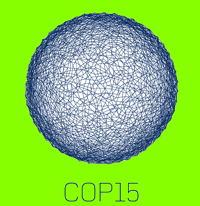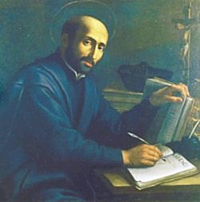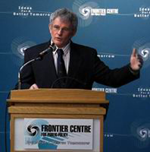I hope my many online friends from the Roman Catholic Church and other churches will maintain their prodigious patience with me: no sacrilege was meant in my adapting the text of Thomas à Kempis' The Imitation of Christ, Book I, Chapter II, paragraph 3.The greater thy carbon footprint, the more severely shalt thou be taxed, unless thou hast good connections. Therefore be not lifted up by any offsets that thou hast; but rather fear concerning the allocation which is given to thee. If it seemeth to thee that thou knowest many things, and understandest them well, know also that there are many more things which thou knowest not. Be not high-minded, but rather confess thine ignorance. Why desirest thou to lift thyself above another, when there are found many more learned and more skilled in climate change than thou? If thou wilt know and learn anything with profit, love to be thyself unknown and to be counted for nothing.
What à Kempis was writing about, of course, was how to live an ascetic life as a Christian, especially if one was cloistered. But his book has become a classic hailed by individuals and groups across the Christian spectrum and is therefore sure to be raided by the votaries of the new religion.
 I'm happy to admit that there are some truths in James Lovelock's theory that some of earth's systems contain compensatory mechanisms - that's how volcanoes work, why the Himalayas are getting taller, and what makes winds to blow my aerial over whenever there's a good rugby game on. (And I have to profess admiration for a man brave enough to suggest that the way to preserve the rainforest in the Amazon basin from development is to bury nuclear waste there.) What gave his theory of what one might call natural checks and balances legs, though, was a suggestion from his fellow villager William Golding, as they walked to the pub, that he swap the various long-winded names for his theory for one word: Gaia - "wide-bosomed Earth" in Hesiod's Theogony. Thus began a series of books and free lunches.
I'm happy to admit that there are some truths in James Lovelock's theory that some of earth's systems contain compensatory mechanisms - that's how volcanoes work, why the Himalayas are getting taller, and what makes winds to blow my aerial over whenever there's a good rugby game on. (And I have to profess admiration for a man brave enough to suggest that the way to preserve the rainforest in the Amazon basin from development is to bury nuclear waste there.) What gave his theory of what one might call natural checks and balances legs, though, was a suggestion from his fellow villager William Golding, as they walked to the pub, that he swap the various long-winded names for his theory for one word: Gaia - "wide-bosomed Earth" in Hesiod's Theogony. Thus began a series of books and free lunches. But what we're experiencing right now - in Britain at least - is a dearth of information about what's happening at the much-vaunted Copenhagen conference (Cop15 - the United Nations Climate Change Conference 2009) at which, we're told some Hard Decisions are going to be made, mostly by people who will not bear their brunt. That's not me being waspish: I've just listened to Matt McGrath's short broadcast from the conference with heavenly ideals, describing the very earthly consequences of herding 34,000 delegates into a centre built to hold 15,000:
But what we're experiencing right now - in Britain at least - is a dearth of information about what's happening at the much-vaunted Copenhagen conference (Cop15 - the United Nations Climate Change Conference 2009) at which, we're told some Hard Decisions are going to be made, mostly by people who will not bear their brunt. That's not me being waspish: I've just listened to Matt McGrath's short broadcast from the conference with heavenly ideals, describing the very earthly consequences of herding 34,000 delegates into a centre built to hold 15,000:But how to convince the people? Affecting to present the facts is the refuge of last resort, especially in the age of Web 2.0, as real facts have an annoying habit of being brought to light. I would highlight veteran climate-change blogger and meteorologist Anthony Watts, of Watts up with That who consistently teaches the apostles of manmade global warming the lesson that every bully learns sooner or later: eventually you meet somebody who's not prepared to back off.
 Again faith finds its treasures ransacked. In his Spiritual Exercises, Jesuit founder St Ignatius of Loyola advises in Exercise number 47 of a type of meditation that consists of seeing "with the sight of the imagination the corporeal place where the thing is found which I want to contemplate". Just so, in the age of what my Mum used to call "the god in the corner", the collective enhanced imagination feeds us adverts where a factory chimney spewing out fumes is recontextualised to become a car exhaust-pipe; a child asks her father whether the bedtime story of a dying earth will have a happy ending and is told to wait and see; and even an advert for a credit card (MasterCard) goes through the prices of various "green" items then delivers the punchline "Helping Dad save the earth: priceless". One advert, whose disingenuousness is even more sickening than its imagery, shows polar-bears falling from the sky in an attempt to get us to fly less (public service note: so many flights took delegates to Copenhagen that some had to park in Sweden until the city's airport could take them).
Again faith finds its treasures ransacked. In his Spiritual Exercises, Jesuit founder St Ignatius of Loyola advises in Exercise number 47 of a type of meditation that consists of seeing "with the sight of the imagination the corporeal place where the thing is found which I want to contemplate". Just so, in the age of what my Mum used to call "the god in the corner", the collective enhanced imagination feeds us adverts where a factory chimney spewing out fumes is recontextualised to become a car exhaust-pipe; a child asks her father whether the bedtime story of a dying earth will have a happy ending and is told to wait and see; and even an advert for a credit card (MasterCard) goes through the prices of various "green" items then delivers the punchline "Helping Dad save the earth: priceless". One advert, whose disingenuousness is even more sickening than its imagery, shows polar-bears falling from the sky in an attempt to get us to fly less (public service note: so many flights took delegates to Copenhagen that some had to park in Sweden until the city's airport could take them).Polar bears are interesting. In Sigmund Freud's 1913 apotheosis of racist western ethnocentrism Totem and Taboo, the psychoanalyst defines the characteristics of an animal chosen to embody the tribe:
As a rule it is an animal, either edible and harmless, or dangerous and feared...which stands in a peculiar relation to the whole clan. The totem is first of all the tribal ancestor of the clan, as well as its tutelary spirit and protector; it sends oracles and, though otherwise dangerous, the totem knows and spares its children. The members of a totem are therefore under a sacred obligation not to kill (destroy) their totem, to abstain from eating its meat or from any other enjoyment of it. Any violation of these prohibitions is automatically punished. [Corrected for transcribers' spelling mistakes]
 The polar-bear has become a totemic representation for the new tribe which believes that if we do not lower our emissions of greenhouse-gases, the polar bears' deaths will herald our own destruction as sure as Nemesis punishes hubris. The reason I'm so interested by Ursus Maritimus is that Dr Mitchell Taylor, an international expert on the beasties, says that polar bear numbers are higher now than they were when he started studying them 30 years ago. "Anathema sit!" cried those of his colleagues for whom this was
The polar-bear has become a totemic representation for the new tribe which believes that if we do not lower our emissions of greenhouse-gases, the polar bears' deaths will herald our own destruction as sure as Nemesis punishes hubris. The reason I'm so interested by Ursus Maritimus is that Dr Mitchell Taylor, an international expert on the beasties, says that polar bear numbers are higher now than they were when he started studying them 30 years ago. "Anathema sit!" cried those of his colleagues for whom this was  in inconvenient truth, and barred him from a meeting of the Polar Bear Specialist Group which was convened earlier this year to raise awareness about how their numbers were falling, and falling because of climate change that the experts/high priests lay at the door of humankind's actions.
in inconvenient truth, and barred him from a meeting of the Polar Bear Specialist Group which was convened earlier this year to raise awareness about how their numbers were falling, and falling because of climate change that the experts/high priests lay at the door of humankind's actions.Freud's contemporary psychoanalyst of Violet Mary Firth practiced as an occultist under the name of Dion Fortune. Having voiced her admiration for the Rite of Mass, she may have drawn deeply from the wells of à Kempis and Loyola, as she prefaced one of her books with the epigram This is not to inform the mind but train it. The sinister puppeteers of the anthropogenic climate-change panic, which one can only assume to be a deception until reliable evidence proves otherwise, have also learnt well.
And what of Gaia? Having created her consort Ouranos (or Uranus, depending on whether you like Retsina or Chianti), he showed his gratefulness by eating their children. He was made to regurgitate them, of course, but there is a principle involved...That's why one of my favourite images from the early Church is a carving of Jesus using Ouranos' head as a footstool. Poor old Gaia might have applauded the scoundrel's fate, had either of them existed.











Love the a Kempis quote! But I wonder if the advice "If thou wilt know and learn anything with profit, love to be thyself unknown and to be counted for nothing" would protect us, anymore?
ReplyDeleteTHere is a sacrilege done by a Monsignor on the altar of his own parish but it seems nothing was done by the higher authority due to his closeness to the Cardinal.
ReplyDeleteYou can see the video of the actual act here.
Pam, you have a point - to live as a Christian now requires one to have a moderate level of knowledge of history, embryology, genetics and all the rest, to which we must now add climatology. Possibly the "unknown and counted for nothing remark was meant to refer to the first being last in the Kingdom and vice versa.
ReplyDeleteNagpakabanang - if what was happening in your video took place on a church altar then it was certainly unorthodox, but I must admit to being confused. What was going on?
Ich think also like pam
ReplyDelete